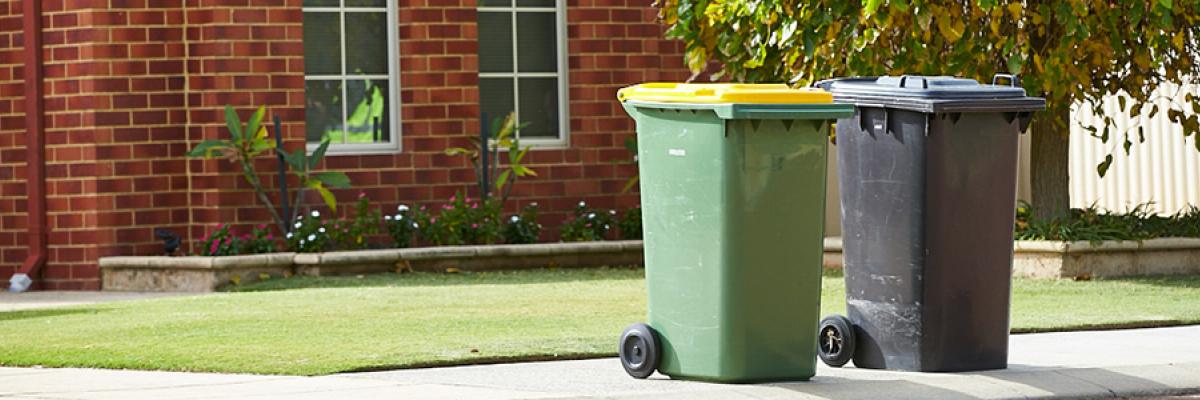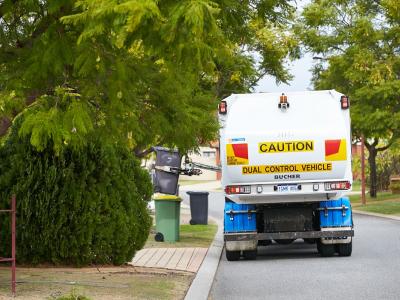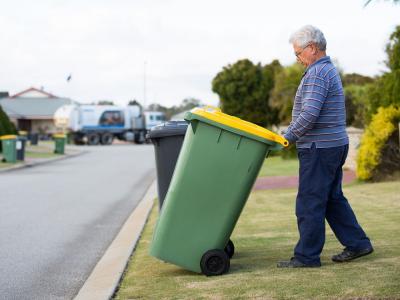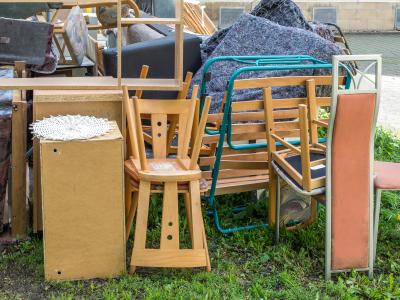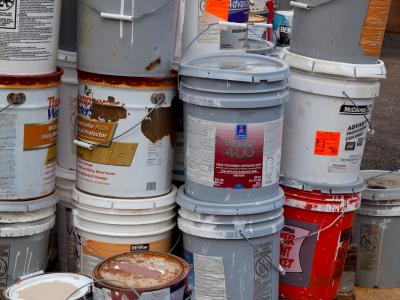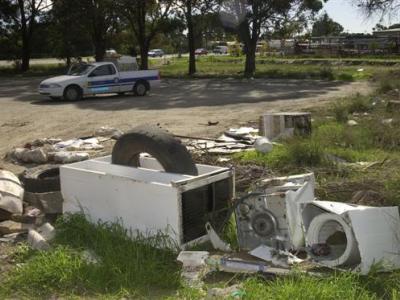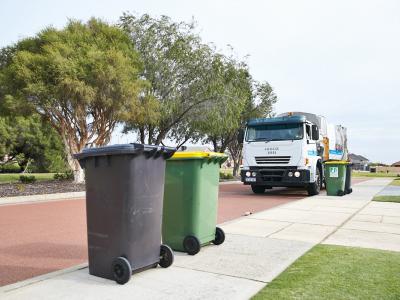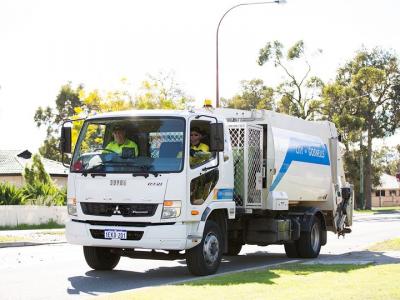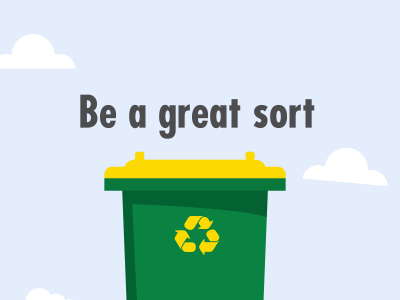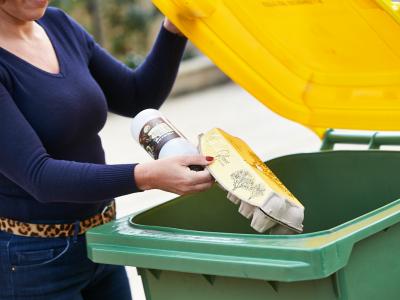
The City of Gosnells offers residents the following collections:
- Weekly general waste
- Fortnightly recycling
- Twice a year bulk green waste
- Once a year bulk general junk
Bin placement checklist
To make sure your bins get emptied, please ensure bins are:
- On the verge by 6am on the day of your collection
- No more than 1m from the kerb
- At least 0.5m apart
- Placed away from trees, parked cars and letter boxes
- Not too heavy and the lids are closed
Note: The City is replacing existing grey-lidded general waste bins with new green bins and red lids. This process will take a number of years to complete.
General waste
The grey or red-lidded 240L rubbish bin provided by the City is for general domestic waste only, such as:
- Food organics
- Garden organics
- Nappies
- Hygiene and sanitary products
- Old/damaged clothing and textiles
- Disposable coffee cups and lids
- Polystyrene
- Soft plastics
City of Gosnells is one of the first local governments in Australia to divert non-recyclable waste away from landfill and return it to energy. Waste is sent to the Kwinana Energy Recovery facility.
Recycling
Yellow-lidded recycling bins are emptied every fortnight. Contents are taken to the Perth Materials Recovery Facility for sorting and baling, ready for transportation off site for further processing.
Recycle these five:
- Paper
- Cardboard
- Cans
- Plastic (bottles and containers)
- Glass (bottles and containers)
Items must be loose, containers rinsed with lids off.
Recycling hubs have been placed at the City's Libraries and the Civic Centre. Items such as aerosol cans, mobile phones and chargers, printer cartridges and light globes can be left at the hubs.
Your general junk and green waste verge collections
The City provides one general junk waste collection per year, usually in Spring. This enables residents to responsibly dispose of large items that cannot be placed in either kerbside bin, including household furniture (excluding glass), electronic waste, white goods, mattresses, scrap metal, timber and other items that cannot be re-purposed or given away.
Bulk green waste is collected twice per year around the end of Autumn and the end of Spring. Tree and shrub prunings in pieces of up to 1.5m in length and up to 30cm in diameter are accepted, as are palm trunks in pieces cut to 30cm.
See more information regarding residential verge collections.
Please Note: The City does not issue tip passes.
For alternative waste disposal sites, contact the following sites for information on waste disposal and costs:
- Resource Recovery Group
- City of Armadale landfill site
- City of Canning waste transfer station
- Recycling near you
GOsFO - Opt-in food waste collection service
In a first for Western Australia, the City of Gosnells will trial an innovative food waste recycling process, with insect larvae converting food waste into high quality fertiliser and providing protein for animal feed. Residents who opt in to the trial will receive a 140L burgundy-lidded bin plus a 5L benchtop caddy with compostable liners, to collect food waste. The burgundy-lidded bins will be collected each week, between Tuesday and Thursday, and we expect to process about five tonnes of food scraps each with. This equates to around 780 tonnes of food waste being processed over three years.
The cost of the pilot program to participants will be $80 per financial year. Residents will be able to dispose of a wide range of food scraps, including fruit, vegetables, meat, seafood, cheese and dairy products, eggs and their shells, pasta, rice, cereal, bread and baked goods, tea and coffee - including tea bags - plus takeaway food and leftovers.
To find out more about the GOsFO trial or sign up to take part, visit yoursay.gosnells.wa.gov.au/gosfo.
Yearly kerbside bin auditing
The City of Gosnells reviews the contents of a selection of residential general waste and recycling bins each year, as part of its ongoing commitment to improve waste management and recycling processes.
By auditing the contents of residents' general waste and recycling bins, the City can identify whether unsuitable items are being placed in bins. With the information, the City is able to develop communications and education strategies to help the community understand which items belong in each bin and which items should be disposed of in other other ways.
The overall aim is to reduce the volume of waste being sent to landfill and to help local residents to recycle effectively. This process also identifies items that should be disposed of in other ways, such as in the recycling hubs at City of Gosnells libraries and the Civic Centre, in specialised collection areas or through battery retailers' retrieval points.
Residents concerned about privacy related to printed documents (such as bank statements, bills, etc) should shred this paperwork before placing it in their waste bin at any time of the year - not only during the audit.
Some of the information collected through the audit process includes:
- Details of the types of items placed in waste and recycling bins, and the volume of those items
- Number of items collected that are eligible to be collected under the Container Deposit Scheme (Containers for Change)
- Levels of recyclable items in the general waste bins
- Contamination and recovery rates in recycling
The waste and recycling bin audits are undertaken without notice, to ensure the information collected by the City accurately reflects local residents' waste disposal and recycling habits. If we told people when an audit would be happening, they might change their habits, and this would provide false results.
The contents of all general waste bins audited are combined in a large pile and sifted through by contractors, who record statistics relating to the items in the bins. The same process is used for the contents of recycling bins. The audit company provides a detailed report to the City after the information they collected has been reviewed and assessed.
The audited waste and recycling material will be sorted into appropriate piles and disposed of through the City's regular disposal processes.
Residents concerned about privacy relating to printed documents (such as bank statements, bills, etc) should shred this paperwork before placing it into the bin at any time of the year.
